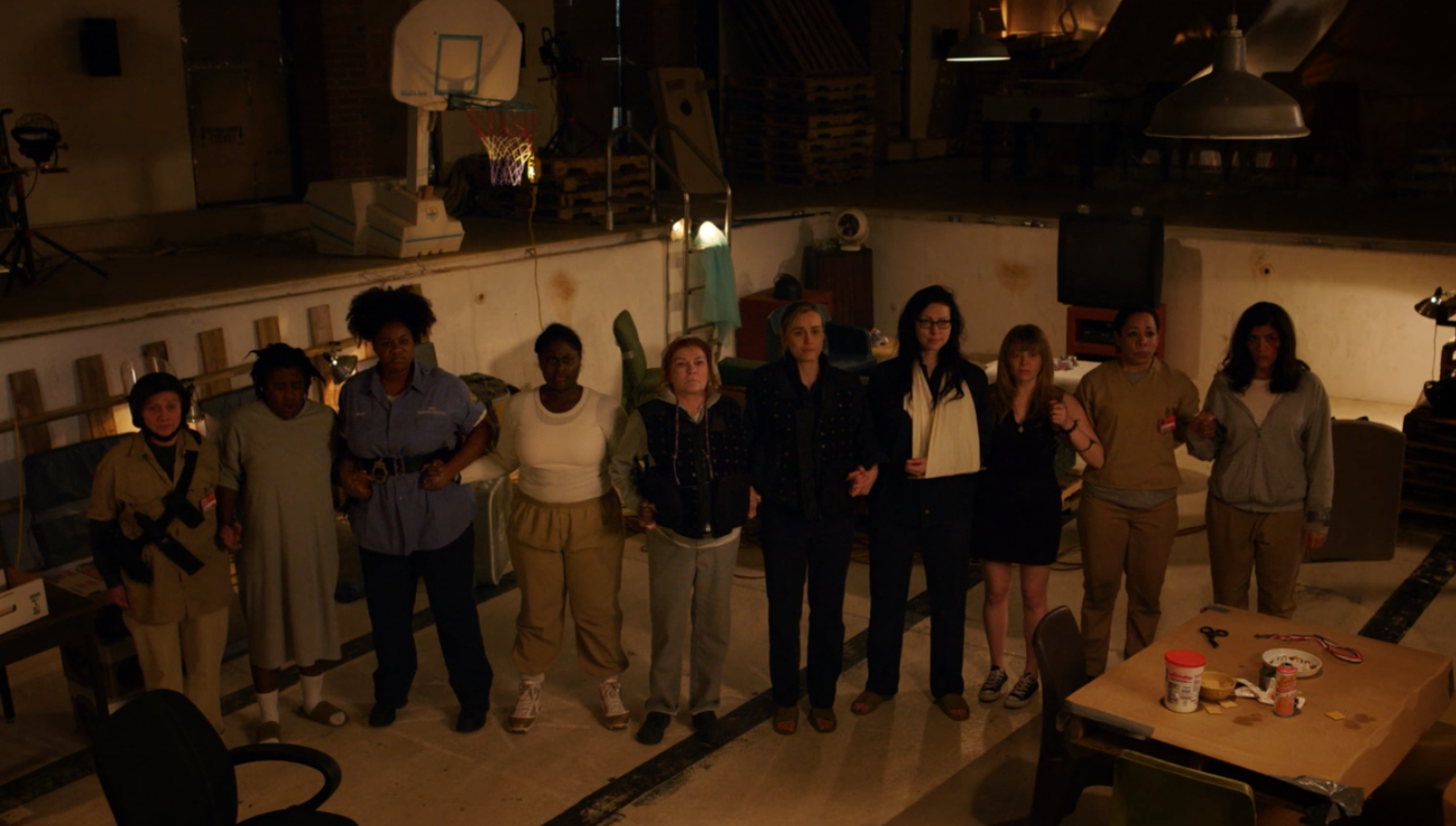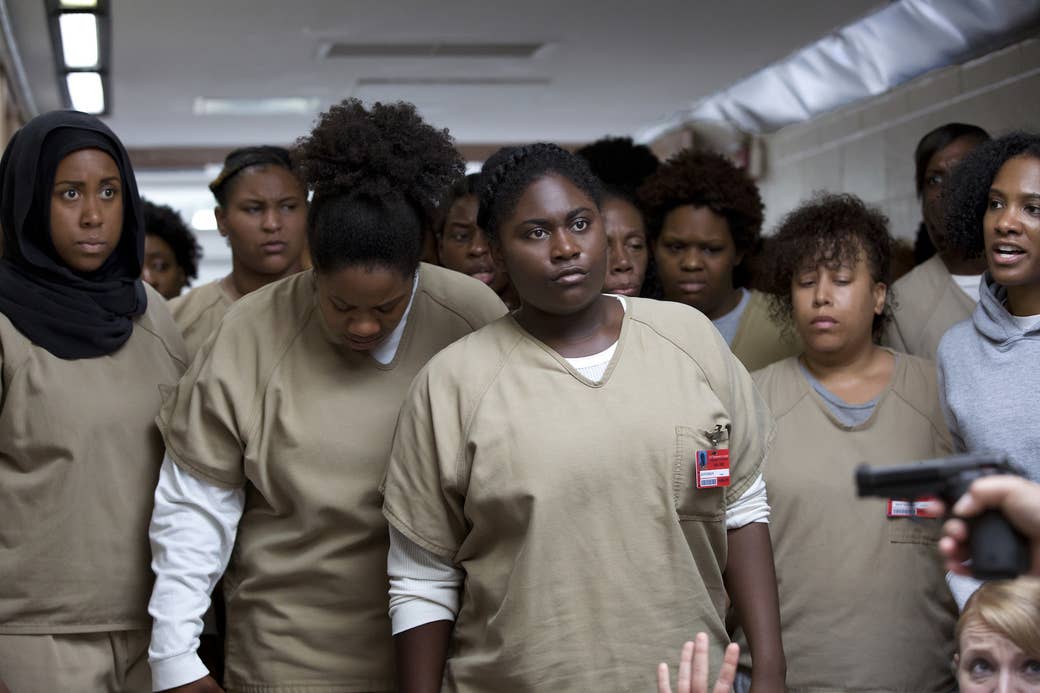
Before she was sent a single script for the fifth season of Orange Is the New Black, Danielle Brooks received an intriguing warning from the show’s creator: “Get ready. You have a lot to do.” Jenji Kohan offered those two vague sentences to Brooks following a performance of Broadway’s The Color Purple, for which she earned a Tony nomination. But even if the notoriously tight-lipped Kohan had elaborated, nothing could have prepared Brooks for what happened next.
Season 5 picks up right where the action left off, with Daya (Dascha Polanco) holding the malevolent Officer Humphrey (Michael Torpey) at gunpoint and the inmates on the precipice of a riot. In Season 4, quality of life had rapidly deteriorated since Litchfield became a privatized prison. There were not enough bunks or supplies for all the prisoners, and the officers were on a terrifying power trip: The inmates were subjected to inappropriate searches, Maritza (Diane Guerrero) was made to eat a mouse, and Suzanne (Uzo Aduba) almost killed Maureen (Emily Althaus) after a guard forced them to physically fight. Those fractured inmate-officer tensions culminated in the most tragic moment of Season 4: when Officer Bayley (Alan Aisenberg) killed Poussey (Samira Wiley).
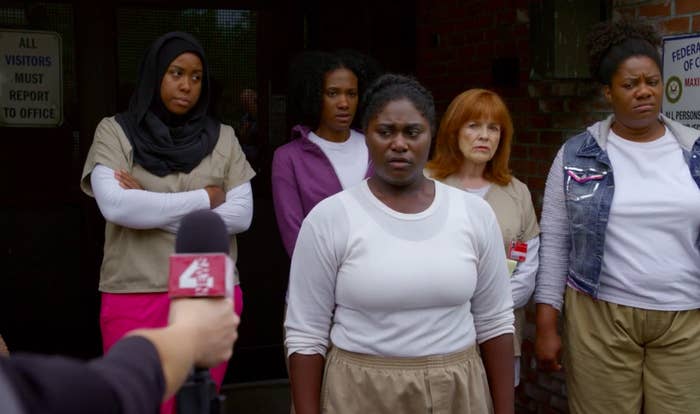
In Season 5, the immense weight of righting all of Litchfield’s wrongs falls to Taystee (Brooks) after she stops famous lifestyle guru Judy King (Blair Brown) from speaking to the press on behalf of the inmates. In doing so, Taystee unwittingly becomes the face of the riot inside the prison and to the world at large. “She is not going to be making a statement,” Taystee tells a throng of rapt reporters who have been covering the melee. “She will not be speaking for us because Judy King can’t speak for the inmates of this prison. She was kept separate from us, held in a private room with better treatment and a seltzer maker. And moments after our friend Poussey Washington was murdered by a guard for doing nothing wrong, Judy King was packing her bags to go home on early release. Because she’s rich. And white. And powerful. Now, our fight is not with Judy King. Our fight is with a system that don’t give a damn about poor people and brown people and poor, brown people.”
“As an actor, that's what I've always longed for: to tell stories that go beyond a story.”
It’s one of many speeches Taystee gives during Season 5 that has real-world implications — which is one reason why Brooks was so easily able to access her emotions when it came to performing these pivotal monologues. “A lot of these moments are much bigger than the show,” Brooks told BuzzFeed News. “To me, that moment was so parallel to what was going on with Diamond Reynolds.” In 2016, Reynolds was thrust into the media spotlight after a police officer shot her boyfriend, Philando Castile, during a traffic stop and she livestreamed the entire incident. “I remember watching so many clips of her speak after Philando Castile was murdered, and she never let her lawyer speak for her. She never needed somebody privileged, somebody white, [to] speak for her. She always did it — and she did it so eloquently. So for me that was such a real moment, because ... I have a brother who is 22 years old and I have a father in his fifties and there's times I am scared for their lives.”
The speech also highlights a brilliant acting choice Brooks made all season long: Whenever Taystee is speaking to someone in a position of power — be it the media, the governor’s liaison, or Natalie Figueroa (Alysia Reiner), the former executive assistant to the warden, who is negotiating to end the riot — she repeats and stresses the pronunciation of “Poussey Washington” as if trying to verbally cement her dead best friend’s name into their brain. For Brooks, it’s another element of Season 5 with deep roots in the real world.
“I want us as a country to really get [that] we have to start caring for people [when] we don't know anything about [them] but their names,” she said, echoing Taystee’s passion. “We have to understand there's a person behind those hashtags whose life really mattered, and to me I just really want us to get that, and I know we don't.” Brooks experienced the disconnect firsthand in 2016, after Wiley’s character was killed off the show. “When Poussey died, a lot of people were connected to her character, and I'd post one picture of her and there would be hundreds of thousands of likes,” she said. “But then I would say something about Mike Brown or Philando Castile or Trayvon Martin or whoever...I mean, fill in the blank at this point, which is just devastating to even say. But there would be one-fifth of the response. That's why I think there's such power in art. There's such power in storytelling. As an actor, that's what I've always longed for: to tell stories that go beyond a story. Tell a story that matters and will be effective to the world that we live in and change lives. That's the ultimate goal. I think a lot of people feel acting is a selfish business, but we're actually here to serve.”
While many of the inmates begin to lose sight of the bigger picture as the riot carries on — they stage talent shows, open up craft shops, and begin selling coffee — Taystee stands as the odd woman out, driven by something greater than a desire for freedom. She never sways from her commitment to obtaining justice for Poussey; long after her compatriots have gone to sleep, she is standing strong at the negotiating table and keeping Figueroa on her toes. Taystee’s season-long advocacy offers her an opportunity that winning Litchfield’s job fair and working alongside Caputo (Nick Sandow), the prison's exasperated but sympathetic warden, never could: a sense of purpose. “I’m good at this,” Taystee says, almost surprised, after taking charge of negotiations. And while Taystee’s success caught her off guard, Brooks was never surprised by her character’s ability to thrive.
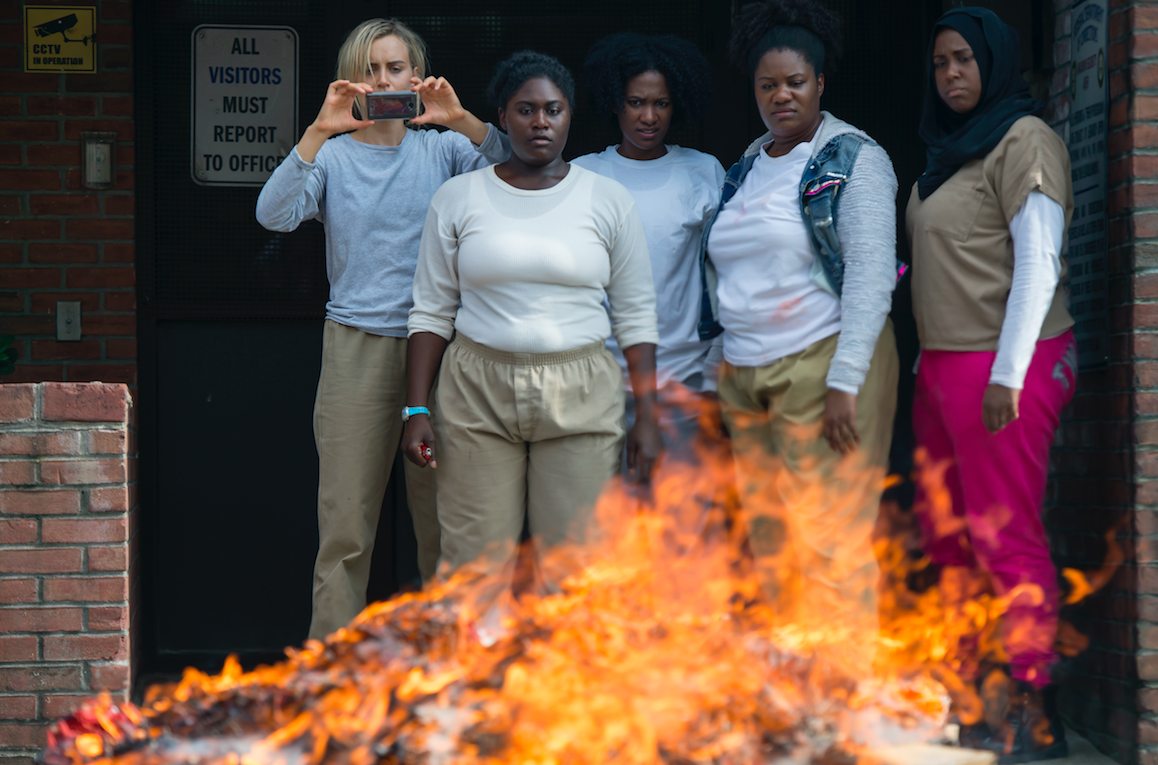
“I've always felt like Taystee was a natural-born leader … but this is a moment in her life where she is taking it further because she has a cause and something to fight for that goes beyond herself,” Brooks said. “It's so complicated to me, because people look at Taystee, especially in the first four seasons, and they're like, ‘She's super upbeat and always the light of the prison and always making a joke.’ But so many people make jokes to hide their pain. This is somebody who was abandoned by her biological mother, manipulated by someone she thought loved her deeply, and lost her best friend right in front of her face; she's been through a lot, but she's always covered it up with laughter or lived in denial. Now I think it's all come to a head, to a boiling point, where she can't do that anymore. She witnessed the only person who has ever shown her what love looks like — true love without wanting anything in return — and that person is taken away from her right in front of her face. It was her breakthrough moment.”
After a thoroughly exhausting negotiation process, Taystee actually gets the governor to reverse course and agree to expand the state’s budget so all of their demands can be granted — except for one: He’s unable to promise that Bayley will be prosecuted for Poussey’s murder because it’s outside his jurisdiction. But Taystee is relentless in her pursuit of justice — perhaps to a fault — and after an unexpected betrayal by Ruiz (Jessica Pimentel), who releases all of the hostages in hopes of shortening her sentence, Taystee loses all her hard-fought gains.
Following several episodes of watching Taystee flourish in her role as prison advocate, this perceived failure might sting, but OITNB writer Lauren Morelli explained that there was no other option. “I think it's always been very important to us to accurately reflect the reality of our prison system, and having the prisoners win these negotiations on any level felt to us very unrealistic,” she told BuzzFeed News. “So we started to think about how Taystee has an individual, emotional win.”
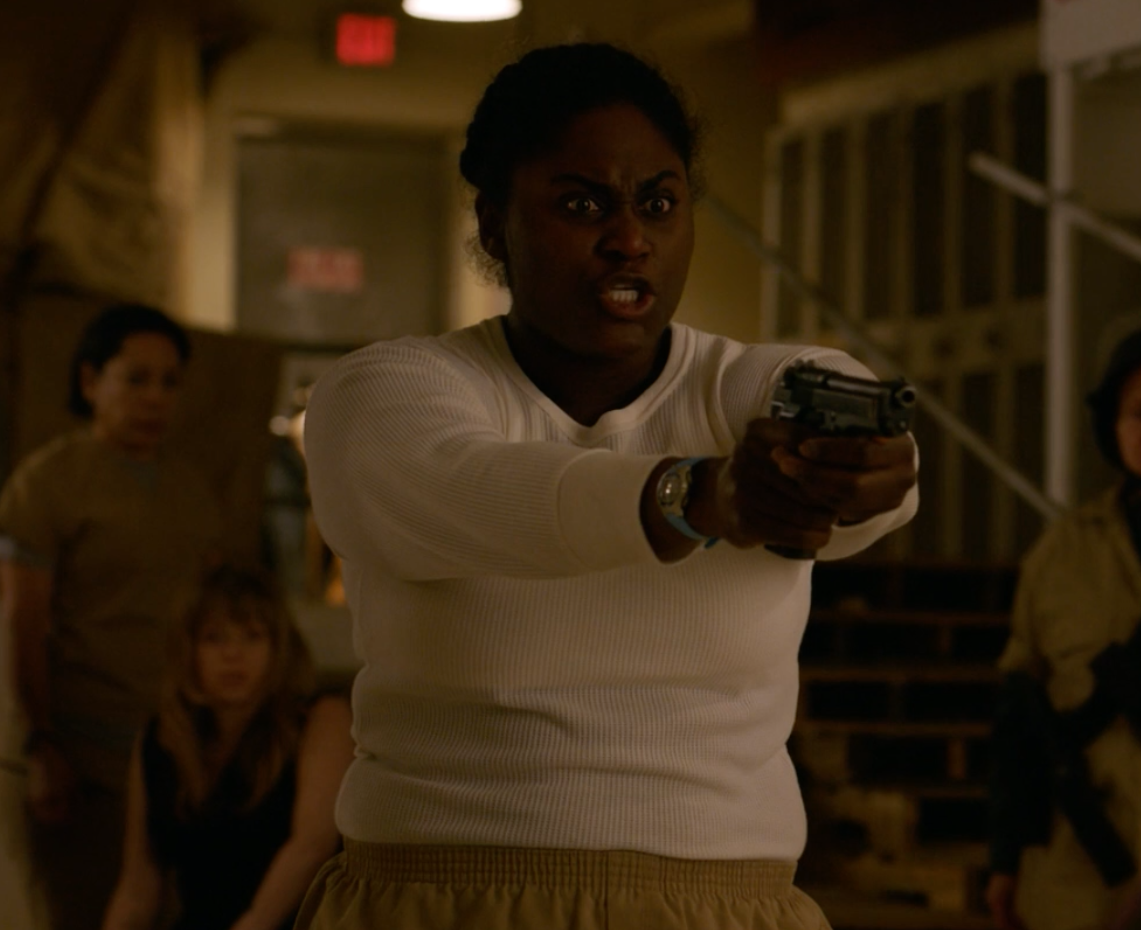
Cue the harrowing capture of Officer Piscatella (Brad William Henke), a figure who was, in many ways, to blame for all the ills that befell Litchfield’s inmates in Season 4: He ruled with an iron fist and fostered the toxic energy that unequivocally led to Poussey’s death. So, although it looked like Season 5 was culminating in a giant negotiation win, bringing Taystee face-to-face with Piscatella was actually what the writers were building toward all season long. And with a gun pressed to Piscatella’s head and no one to stop her, Taystee makes the choice to spare his life. She refuses to become the monster he perceives all criminals to be, and that, more than any institutional triumph, is the greatest victory she could experience.
“It breaks my heart that she didn't win in that way, and to be honest, I don't know if Taystee will ever realize this, but I think she did win,” Brooks said. “I really don't think she lost, because in that last scene when she's holding the gun at Piscatella and she chooses not to shoot him, that's when she realizes what justice really means. It's about your character. Are you going to treat somebody the way in which they horribly treated you, or are you going to say, ‘No, I'm not going to do that’? I feel like that's her win. Saying, ‘You're not even worth me changing my character and me leaving without my dignity. You're not worth it.’ I do feel like she won.”
“Halfway through the season, she starts to feel like she's fighting this battle by herself. But that's the moment where she realizes, I'm not alone in this. And that's how we should feel as a society, too. We have to support each other.”
While Taystee may have won, the rioters lost, and the final scene of the season shows Taystee linking arms with her Litchfield family as they wait for the CERT team to break in and reclaim their authority. But even in that dire moment, Brooks sees a beautifully uplifting end to Taystee’s Season 5 journey. “It's a reminder that she's not alone,” she said of Taystee standing united with her fellow inmates. “Halfway through the season, she starts to feel like she's fighting this battle by herself. But that's the moment where she realizes, I'm not alone in this. And that's how we should feel as a society, too. We have to support each other.”
After a season of onscreen events that had immediate connections to offscreen life, it’s fitting that her final moment — like much of Taystee’s journey this year — was directly informed by real-world events. “When we filmed that scene, a few of us had just been to DC for the Women's March,” Brooks said. “To be in DC at that march with what felt like millions of women and feeling supported with whatever cause that brought us all together was an overwhelming feeling. I think that's how Taystee feels in that scene. It does feel overwhelming, but it also feels doable. Yes, we can fight if we fight this fight together.”
